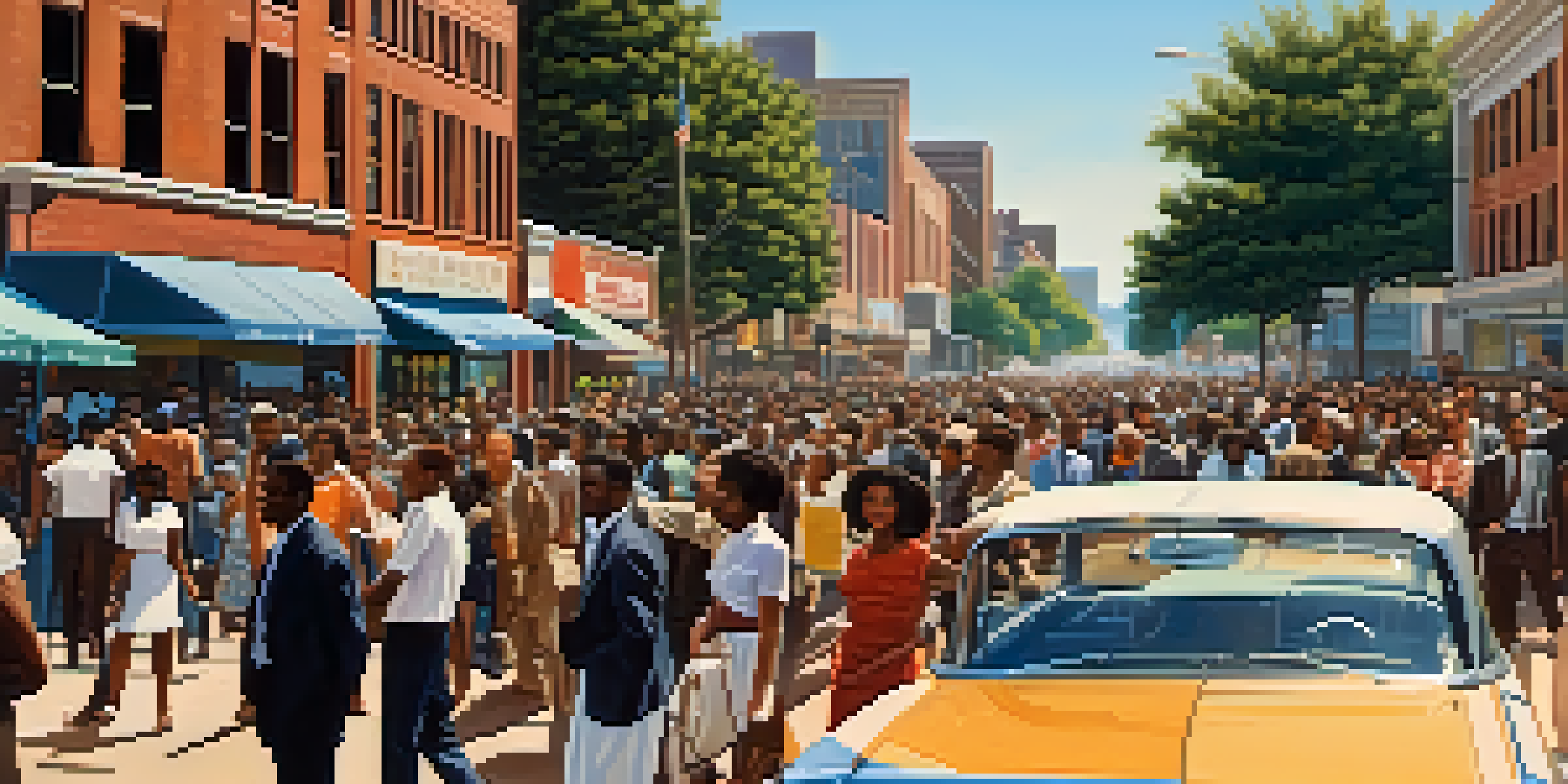The Influence of Atlanta's Media on Civil Rights Awareness

The Birth of Civil Rights Journalism in Atlanta
In the mid-20th century, Atlanta emerged as a pivotal hub for civil rights journalism. This city was home to influential newspapers like the Atlanta Daily World, which was among the first African American newspapers in the U.S. It provided a vital platform for voices advocating for equality and justice.
Injustice anywhere is a threat to justice everywhere.
These publications played a crucial role in informing the African American community about civil rights issues, helping to galvanize support for the movement. By addressing local injustices and sharing stories of resilience, they inspired many to take action. This grassroots level of journalism was instrumental in shaping public perception.
Moreover, the presence of prominent journalists and activists in Atlanta fostered a culture of advocacy. Their stories not only reported on events but also highlighted the human experience behind the struggle for civil rights, making it relatable and urgent.
Television's Role in Amplifying Civil Rights Messages
As television became increasingly popular in the 1960s, Atlanta's media landscape evolved significantly. Local stations began to cover civil rights demonstrations and events, bringing the struggles of activists into living rooms across the country. This visual storytelling was powerful, offering an immediate connection to the movement.

Programs like 'The Atlanta Journal' showcased the voices of civil rights leaders, allowing them to articulate their visions for change directly to the public. Such coverage not only informed viewers but also humanized the individuals behind the movement, fostering empathy and support.
Atlanta's Role in Civil Rights Media
Atlanta was a crucial hub for civil rights journalism, providing a platform for voices advocating for equality and justice.
The impact of televised coverage was profound; it turned local grievances into national conversations. As shocking images of protests and police brutality aired, they spurred public outcry and increased pressure on lawmakers to act, demonstrating the media's ability to influence social change.
Radio as a Mobilizing Force for Change
While print and television were crucial, radio also served as a significant tool for civil rights advocacy in Atlanta. Stations like WERD, the first Black-owned radio station in the South, provided a platform for activists to share their messages with a wider audience. Through broadcasts, they could reach listeners in real-time, fostering a sense of community and urgency.
The press is the enemy of the people until it becomes the friend of the people.
Radio shows featured discussions on civil rights issues, interviews with leaders, and updates on protests, effectively mobilizing listeners to participate in the movement. This immediate form of communication was vital in a time when many relied on radio as their primary source of news.
The power of radio lay in its ability to create a sense of belonging among listeners. By tuning in, individuals felt part of a larger movement, encouraging them to become active participants in the fight for equality.
The Atlanta Constitution's Investigative Reporting
The Atlanta Constitution, one of the city's major newspapers, played a critical role in shedding light on civil rights issues through investigative reporting. Journalists delved deep into systemic racism, discrimination, and the struggles faced by African Americans in the South. Their commitment to uncovering the truth made a significant impact on public awareness.
Through detailed articles and exposés, the Constitution not only informed the public but also held powerful figures accountable. This type of journalism can be likened to a spotlight illuminating dark corners, forcing society to confront uncomfortable truths about race relations.
Impact of Television on Awareness
Television transformed public perception of civil rights issues by bringing powerful visual stories of protests and activism into homes.
By fostering an informed readership, the Constitution encouraged dialogue and debate about civil rights, ultimately pushing the movement forward. Their efforts demonstrated how media could serve as a powerful ally in the quest for justice.
The Influence of Local Activists on Media Coverage
Local activists in Atlanta were not just subjects of media coverage; they were also influential in shaping it. Leaders like Martin Luther King Jr. and Andrew Young understood the importance of media in advancing their message. They often engaged directly with journalists, ensuring that their perspectives were accurately represented.
These relationships between activists and the media created a mutually beneficial dynamic. Activists provided journalists with crucial information and firsthand accounts, while media coverage amplified their messages, helping to mobilize support and resources.
The collaboration between media and activists highlighted the power of storytelling in activism. By sharing their experiences, activists could influence public opinion and inspire action, demonstrating how interconnected the two realms truly are.
The Legacy of Atlanta's Civil Rights Media
The legacy of Atlanta's media during the civil rights movement is still felt today. The narratives crafted by journalists and activists have shaped contemporary discussions about race, justice, and equality. Their stories continue to inspire new generations of civil rights advocates.
Modern media outlets in Atlanta often reference this historical context, reminding audiences of the struggles and triumphs of the past. By acknowledging this legacy, they reinforce the importance of vigilance in the ongoing fight for civil rights.
Legacy of Activism and Journalism
The collaboration between local activists and media in Atlanta set a precedent for storytelling in activism, influencing modern civil rights discussions.
Moreover, the lessons learned from this era emphasize the need for responsible journalism. As today's media landscape evolves, the commitment to truth-telling and advocacy remains essential in addressing contemporary civil rights issues.
Challenges Facing Civil Rights Journalism Today
Despite the progress made, civil rights journalism faces numerous challenges in today's media landscape. The rise of misinformation and the decline of local news outlets have made it harder for important stories to reach the public. Journalists must navigate these obstacles while maintaining a commitment to ethical reporting.
Moreover, the digital age has transformed how information is consumed. The rapid spread of news on social media can sometimes overshadow the thorough investigative work that characterizes quality journalism. This shift raises questions about the depth of coverage given to civil rights issues.

As we reflect on Atlanta's media history, it's crucial to advocate for a robust journalism practice that prioritizes accuracy and representation. Ensuring that diverse voices are heard will be essential in continuing the legacy of civil rights advocacy.